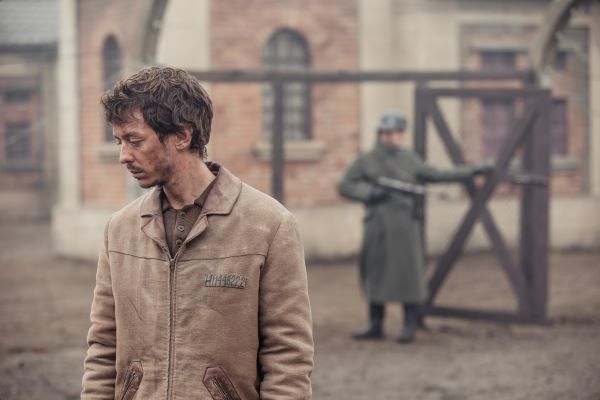Treading the line of invention is a difficult option, and potentially dangerous when devising a Holocaust survival story. But in the end, director Vadim Perelman‘s Persian Lessons has little intention of maintaining authenticity throughout; instead, focusing on specific aspects which, tragically, are lost to many, and the dramatisation surrounding these specifics draws them to the forefront.
In a bid to save himself from execution by a mob of Nazi officers at the roadside, a Belgian Jew convinces them of his worth – not as a Jew, but as an Iranian Persian after overhearing their commanding officer’s need for one. Stealing the name of a deceased traveller, Gilles adopts ‘Reza’ and becomes invaluable to the commandant of a Nazi transit camp. But Gilles comes to realise that regardless of his attempts to prolong his life, one of fear, that the inevitable reality of the atrocities surrounding him will claim him one way or another.
Perelman’s film centralises communication, both in the obvious and background. Ilja Zofin’s screenplay takes the manipulation of language for granted as Gilles teaches Farsi to camp commandant Klaus Kock, one word at a time. Soon tasked with forty words per day, along with kitchen and farming duties, Gilles is ‘promoted’ to the aid of Klaus, recording all the names of prisoners who arrive to the camp, striking off the names of those who perish along the way. But the manipulation of real events doesn’t blanket or lessen the atrocities as the film draws to a close. Millions of prisoners, mainly Jews, were executed to hide evidence of the camps and in a final act of heinous cruelty, the record logs of names were burned, so that even in death their identities were struck from memory.
And here-in lies the divisive nature which will turn audiences away, where absurdist comedy has little to no place mingling with wrought human tragedy. That would be if Perelman didn’t seed the two in a rather impressive (if flawed) duality where humour enables the barrier surrounding the narrative to become permeable. The laughs roll and build, lulling a significantly false sense of security until the film’s plunge into the devastation of its conclusion. It deftly serves the humour as a safeguard, a doorway into turning history into experience, while not heavily undercutting authentic reality or respect.
A principal issue lies in the language used by the film to communicate stereotypes, rehashing them as shortcuts for storytelling mechanics. Reason too seems to be lacking in much of the direction the film takes, particularly motivations. But in a film concerning war, reason takes a back seat. Particularly in the film’s narrative antagonist Max, a young Nazi officer who takes a particular dislike to Gilles, despite it being a hindrance and danger to his position.
Despite this, where all else fails, Persian Lessons has two lead performances which enrapture, even under the circumstances of the script. Nahuel Perez Biscayart’s forlorn nature evokes a profoundly intimate performance, capturing the nuances of multiple emotions without belittling the memory of so many. And though far from a saviour, Biscayart’s quiet, thoughtful nature often accompanies the film’s significant moments of humanity. Ringing in a candour similar to Adrien Brody’s The Pianist, but exposing the film’s other cartoonish stereotypes. Capturing these sombre notes is the film’s limited, but effective cinematography with a rustic colour tone and score. And though most of the Nazis in the film are two-dimensional villains, Lars Eidinger finds the mortality behind the monstrous. But Eidinger refutes the stretch into sincerity or, heaven forbid, redemption, stripping back the ideologies of the Nazi party and demonstrates the aspirations Klaus longs for, away from Germany and the Third Reich.
Transcribing what could have been a disastrous and blatantly offensive mess, Persian Lessons ripples a sense of absurdist comedy through tragedy and emerges the other side. Elements are frayed, and reasoning falls short, but at its core, Persian Lessons maintains a level of dignity, benefitting tremendously from two magnificent leads. Leading to a closing scene which rends out the humour, and replaces it with the harrowing pain expected of a Holocaust-survivor story.
Streaming digitally now, and on DVD Mon Feb 8th
